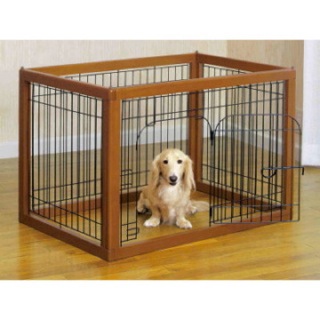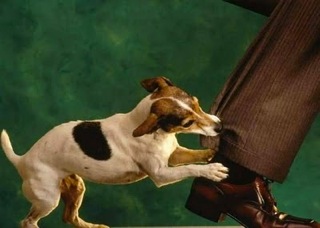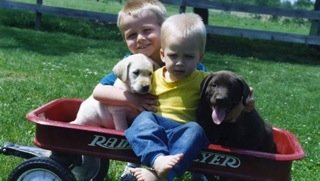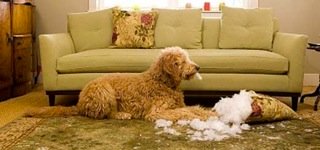|
Solutions to Puppy Problems
Dogs are social animals. Being left home alone is another life experience to which puppies must become accustomed. Even if you are home with your puppy and are able to have her with you all the time, it is important for her to become accustomed to periods of separation. This is equally true if you have an adult dog who is a new member of your family. Dogs who are unaccustomed to being alone can become so stressed when left that they engage in destructive behavior. When you do leave your puppy alone, make sure that she is in a safe area where she cannot get in trouble. A crate is ideal for short absences (up to four hours). If your puppy is going to be alone for longer periods during the day, a puppy proof room or portable pen might be a better solution.

Exercise pens may be purchased inexpensively through the supply catalogs and online. There are a number of things you can do to help your puppy be contented while you are gone:
Nothing is much cuter than a child and his puppy. Puppies and children seem to have a natural affinity for one another. Having said that, dogs and children are not always a good mix, and a great deal of diligence and good management are often required to keep this relationship safe and satisfying. Young children and dogs should not be left alone together without supervision. As wonderful as your dog is, it is wise to remember that he is a carnivore with and incredibly punishing bite that can be used for self defense or aggression. Every year an unnecessarily high number of children are bitten by their own dog or a dog belonging to someone else. Most of these bites could be prevented through better management. It is every parent’s responsibility to teach his children proper behavior around dogs. Conversely, those of us who own dogs are also responsible for their behavior around children. Pet owners who have children obviously have a double role.
Preventing Problems Dogs bark when they are alarmed, they bark when they are excited, they bark when they want something and they bark when they are bored. Some dogs bark at the slightest provocation and other almost never bark. Of all the natural behaviors out dogs engage in, inappropriate or prolonged barking can be the most annoying and frustrating to the owner. Remember that any behavior that is reinforced will increase. It is very easy to make a barking dog bark more if we are not careful what we reinforce. If your puppy discovers that whenever you leave him alone, you will return if he barks and cries long enough, you will have a dog that will bark with incredible determination when left alone. Dogs are social animals and our attention is very reinforcing. Even if your return is angry and unpleasant, for many dogs bad attention is better than no attention. When your dog is left on his own, he should be comfortable, safe, well exercised, and have things to occupy him. Reread the section Home Alone for ideas on keeping your dog entertained, and use your own imagination and knowledge of your dog to get other ideas. When your dog is not barking and is entertaining himself, reward him with your attention and perhaps some new interesting playthings. If your dog is barking, do not return to him until he is quiet. If your dog barks easily whenever he sees or hears anything, you can do things to make his environment a little less stimulating. When you leave him, have the radio playing to cover outside noises. Install privacy fencing to obstruct his view of the street or neighbor’s yard. If he spends his time with you in the house barking at squirrels or birds, close the appropriate blinds. Most of us are happy when our dog barks to alert us. When they continue to bark long after we have been alerted, it then becomes a nuisance. When your dog barks because he hears something, acknowledge his efforts “Good Job, Thanks for warning me!” Then distract him from the noise and get his attention. Reward him for being quiet. When you are able to get his attention easily, add a signal “Hush” for quiet, and reward him when he is. To distract him while barking, you can make an odd noise, drop something, shake something, spritz him with water or go out of the room. When he is quiet, give him a reward. If your dog barks at you whenever he wants something, he has already learned that he can get his needs met by barking. Stop rewarding him when he barks at you. If he has been successfully doing this for a while, he will be quite determined. If you can stand it, the next time he barks at you for something, totally ignore him until he stops. When he stops barking and has found something else to do, give him your attention. If you cannot stand ignoring him while he is barking in your face, get up and leave, or remove him from the area. Wait until he is quietly doing something else and then pay attention to him. Unlike mouthing or chewing, barking does not get better as your dog gets older. In fact, it often gets worst. If you have a noisy dog, it’s very important to start immediately encouraging quiet, appropriate behavior. Problems with jumping behavior can be avoided if we make sure there is no reward in it! There is no touching, looking at or talking to a puppy unless his feet are on the floor. We greatly reinforce with praise and/or treats, all “four on the floor” behavior, and simply walk away if the puppy jumps up. Digging is another normal thing that dogs do. They dig to find things, to make holes to lie in, to get under fences and, sometimes, they just dig! They are apt to dig a lot when they are bored and do not have enough to do. If your yard is lovely and you do not want holes in it, always supervise your dog when he is in the yard for any length of time. If you want to leave your dog outside by himself, the best solution is to fence a portion of the yard for your dog’s use. You can provide an area where he can dig or, if you object to him digging at all, you can use patio block or some other surface to make it impossible. Guarding food, toys, bones, etc. is a normal canine behavior. It also can be very dangerous if your dog is aggressively guarding things from you or other family members. Dogs guard things because they have value to them, and they do not want someone else to have them. Knowing this can help you make sure that your puppy does not develop guarding behavior. Whenever your puppy has something in her mouth, compliment her on how smart and clever she is. Pat her and rub her if she will stay near you. Sometimes offer to trade her a tasty treat for what she has. If it is something that she can have, give it back to her. Never grab or pull things from your puppy’s mouth or chase after her to get something from her. If she has something she is not supposed to have, compliment her anyway, trade her for a treat and next time pick up better! Not only will your puppy learn to trust you with whatever she has, she also will not learn to play keep away and she will be learning the foundation of retrieve. Hand feeding is an excellent way to keep your puppy from becoming possessive about his food. When you are using a bow, get in the habit of always adding food to her bowl. If you notice that she is getting growly around her bowl, get rid of the dish and hand feed her for a while. Some dogs get extremely crazed around rawhide or bones. If you have a dog who is fine otherwise but guards a rawhide, do not give her rawhide!
Chewing is another normal canine behavior. It is part of being a carnivore. All puppies like to chew and some puppies like to chew a lot. We do not mind when they chew on their own toys, but it becomes a problem when they chew something of value to us, like our shoes, furniture, or the TV remote! Puppies view the world as on big chew toy. Tather than frustrate yourself and you puppy by trying to teach him all the things that you do not want him to chew, this problem is more easily solved by puppy proofing his living area and supervision. Provide your puppy with plenty of his own toys and good things to chew on. Alternate them to keep them more interesting. Turn to the section on Helpful Hints for how to make Kongs and natural bones high powered chew toys. Make his own toys more interesting to him by rewarding him for playing with them and sometimes join in the play yourself. Make sure he has plenty to do and gets lots of exercise. Most puppies outgrow indiscriminate chewing during their first year, and then you can begin to relax your vigilance. Nothing is of more concern to the new puppy owner than what to do about biting. To make it more difficult, there is lots of different advice given on the subject. Some of the things that owners are routinely told to do can actually make biting worst, and can turn play biting into aggressive snapping and growling.

Puppies bite because that is what puppies do. It is normal puppy behavior. If you watch puppies play together, they spend much of their time biting each other. Through this type of play they learn to control and inhibit their bite. If you do not want your puppy to chew on you and your family, you must make sure that he has many other allowed outlets for biting. Refer back to the section on Exercises and Games . You must also be careful not to reinforce him for biting you. Remember that your attention is a very strong reinforcer. If he learns that every time he bites you, you immediately pay attention to him by telling him no, grabbing his muzzle or giving him a shake, all of which he may see as an escalation of the game, he may actually start biting you more! If your puppy is biting you during play and he is using a soft mouth, you can simply ignore the biting and continue playing with him. You can also redirect him to something else to bite on if you prefer he did not put his mouth on you. If he bites too hard you can react with a wounded screech, stop the game immediately, and leave and ignore the puppy. You can resume the game again after a short time out. If your puppy lives with children, refer back to the section on Living With Children. Some puppies are much more mouthy than others and some have a much harder mouth. It will be more difficult for these puppies to keep control. If you have a puppy like this it is very important that you provide lots of other outlets and that you insure he is well exercised. Remember...the game ends abruptly the second he bites too hard! Sometimes puppies can get over-stimulated, over-tired, and out of control. If this seems to be the case, the best thing to do is calmly put him in his crate with his Kong for a nap. Biting is a stage that puppies go through. Just remember that it is normal. Handled correctly, it never needs to become and issue. Buster Cube- This is a hard plastic cube that your dog pushes around with his nose or feet in order to get out pieces of dry dog food. This is a wonderful entertainment for dogs that need more mental stimulation. Your dog’s entire dinner can be fed with the cube and it can take as long as 45 minutes to empty. Kongs- Kongs come in several sizes to fit all dogs and are made of hard, very durable rubber. They are bell shaped, hollow and have openings at both ends. They are useful as a fun retrieving toy, but even better, they can provide hours of solitary entertainment and chewing enjoyment for your dog. Stuff the Kong with kibble or small pieces of biscuit and enough peanut butter, cream cheese or liverwurst to stick the kibble together and keep it inside. When you need some quiet time or when you need to leave the puppy alone, put the puppy in his crate with his Kong and relax. Kongs can be washed in the dish washer and can be made up ahead and frozen. kongcompany.com
Carsickness- Many puppies become carsick when they first start traveling. Keeping him home will not help him get over this. Traveling to fun locations is the best cure. Ginger is soothing for upset stomachs and many people have had success giving their puppy couple of ginger snaps a short time before the trip. Some puppies travel more comfortably in a crate and, if they do get sick, it is much easier to clean up after them. Clean-Up- Please remember to clean up after your dog if he eliminate anywhere other than your personal property. Become used to carrying a few baggies with you whenever you and your dog are out in public. If you need to clean up, put your hand in the baggie, pick up the droppings and turn it inside out. The droppings are in the bag and your hand is clean. Close the bag and put it in an appropriate trash container.
Return from "Puppy Problems" to " Puppy Training"
|


